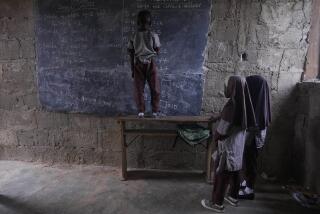Iraq gives power rationing a try
- Share via
BAGHDAD — Several weeks ago, workers from the Ministry of Electricity came to Abdul Kareem’s door and asked him to fill out a form stating how many people live in his east Baghdad home. Next, the laborers installed a small box inside Kareem’s home and then climbed an electricity pole outside and began fiddling with it.
Kareem didn’t know it then, but he and his neighbors had become guinea pigs in an Iraqi government experiment to limit electricity use as demand soars, supply lags and officials accept that they cannot close the gap.
The plan, launched nearly three months ago, represents the latest break with one of the biggest promises made after the 2003 U.S.-led invasion: that services such as electricity and water would quickly surpass prewar levels.
If anything is seen as symbolic of the United States’ failure to deliver on its promise that life would be better without Saddam Hussein, it is the lack of reliable electricity. And as Iraqis endure their fifth blazing summer without sufficient power, it is no surprise that resentment toward American forces remains fierce.
Counterinsurgency experts, including Army Gen. David H. Petraeus, the current commander of the war, say restoring basic services is crucial to winning the public’s trust, and Iraqi government officials agree.
“If the United States wants Iraqis to view them as friends, they have to improve the services,” said a spokesman at the Ministry of Electricity, Abu Samir, who calls the new experiment “a last resort.”
“It’s not really what we want, but it’s the only way we can supply electricity on a wider scale,” he said.
Under the plan, each residence on a block has been allocated a limited number of amperes, depending on its estimated needs based on how many people live in the home. Most households receive 10 amperes of electricity, enough to run a refrigerator, a TV and an air cooler, which uses a fan and water to circulate chilled air.
The amount of power is not enough to run an air conditioner, water heater or most major appliances at the same time as lamps, refrigerators or other common household items. To do so would require a generator.
‘It is easing suffering’
The experiment is underway in three Baghdad neighborhoods and in sections of Hillah, Najaf, Karbala and Diwaniya south of the capital, ministry officials said. Some welcome it as a way to at least ensure that everyone gets a share of the available power.
Raheem Jaafary, a Hillah-based ministry official, says the idea is to teach people to conserve.
“It is easing suffering, so we are achieving something,” Jaafary said of the new system. “We don’t have any option.”
Experts on postwar reconstruction say the electricity issue is a prime example of the United States’ failure to respond adequately to the chaos after the fall of Hussein.
Instead of trying to rebuild power plants neglected by Hussein and further damaged by the war, for example, the U.S. would have been better off delivering temporary mobile generators to neighborhoods, said Rick Barton at the Center for Strategic and International Studies in Washington.
The focus on power plants and transmission towers made them appealing targets to anti-U.S. forces, who stage almost daily attacks on Iraq’s infrastructure.
“Generators are not the long-term solution, but it probably would have reduced the attractiveness of attacking large projects,” said Barton, an expert on rebuilding war-torn societies.
To outsiders, Iraqi complaints about power shortages might seem trivial in comparison with bombings, sectarian violence and political inertia. But during summer in Iraq, where the temperature rarely falls below 100 even at night, not being able to run an air conditioner or fan is an infuriating misery on top of the other indignities Iraqis have suffered since the war began.
In the summer, many who don’t have power sleep on their roofs, where desert breezes offer some relief. In the open air, though, they are vulnerable to stray bullets and gunfire from U.S. helicopters engaged in combat operations. They might also be mistaken for insurgents and fired on if they are spotted creeping around on rooftops.
Many here have generators to fill the long gaps in state-provided power, which averages a few hours a day in Baghdad. But the long lines to buy fuel for generators puts them at risk of attacks from suicide bombers.
Iraqis even risk being attacked when they step outside to switch generators on or off. Last month, a Baghdad hospital director, Mohammed Abdul Aziz, was ambushed by would-be kidnappers who knew his usual time for turning off the household generator. They shot and killed Aziz’s son, Noor, when he came to the door to check on the commotion outside.
Inadequate electricity also means more frequent trips to the market to buy perishable food. Markets are favored targets of bombers.
‘It’s a blessing’
The experiment that Kareem became part of alleviates some of the discomfort, but only for 12 hours a day in three-hour off-and-on spurts.
Kareem said that because there are four families living in his house, he was granted 20 amperes.
“It’s a blessing from God. We are now enjoying the cold air provided by coolers,” Kareem said. “Everyone in the neighborhood is relieved. This is a wonderful plan.”
Umm Makram was not as impressed because of the long breaks without electricity, but said the system was better than before because it ensured at least some power.
“But if we want to talk about progress, we shouldn’t talk about 10 amperes. We should talk about when there will be real electricity,” she said.
Umm Makram said the workers who came to her home were accompanied by ministry supervisors sent to ensure that no occupants bribed the laborers to give them additional amperes.
U.S. officials say that the situation is not as dire as many Iraqis claim and that the inability to keep up with electrical demand is a good sign.
“It means people are able to buy more luxury items -- washing machines, televisions, air conditioners,” said Brig. Gen. Michael Walsh of the Army Corps of Engineers at a Baghdad news briefing. Walsh said demand for electricity had risen more than 70% above prewar levels.
Before the war, Baghdad got 16 to 24 hours of power a day, and the rest of the country barely any. Now, areas denied power for political reasons by Hussein are getting far more, but the capital receives far less.
But daily production still is below prewar levels of about 4,000 megawatts a day. Demand is between 8,500 and 9,000 megawatts daily.
Jaafary said that reaction to the limited-use plan had been positive and that other neighborhoods had asked to be included. But the plan is only temporary, he insisted.
Asked when the need might end, he said, “As soon as we can increase output.”
Asked when that would be, he replied, “Maybe in five years.”
Times staff writers Mohammed Rasheed and Saif Hameed contributed to this report.
More to Read
Sign up for Essential California
The most important California stories and recommendations in your inbox every morning.
You may occasionally receive promotional content from the Los Angeles Times.














